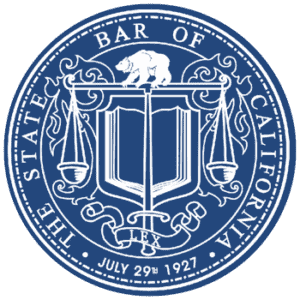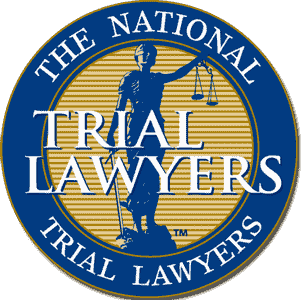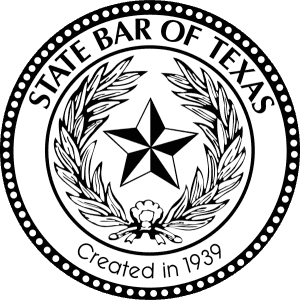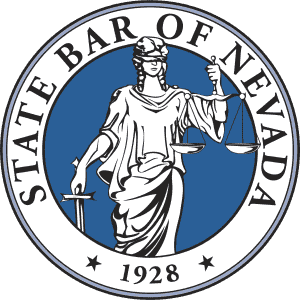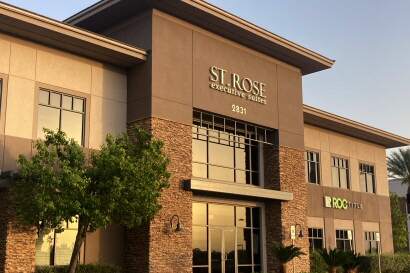AUTONOMOUS CARS AND PERSONAL INJURY LAW
Estimated Reading Time: 7.8minutes
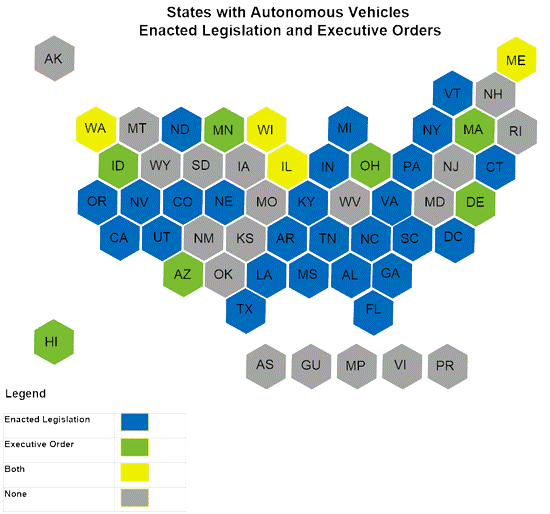
State Overview of Autonomous Cars
- Nevada was the first state to Allow Autonomous Cars
- All States now have legislation enacted or pending regarding Autonomous cars
- Lyft has over 25 Autonomous vehicles on the Road in Las Vegas
- Google has more than 40 self-driving cars on the Road near Austin, Texas.
- Most accidents involving driverless cars have been a human’s fault.
http://mentalfloss.com/article/74964/10-things-you-didnt-know-about-self-driving-cars
If you’re in Las Vegas, or now most major metropolitan cities, you may have observed or experienced autonomous vehicles on the road. Lyft recently announced that it would be putting 30 autonomous vehicles on the road in Las Vegas. Lyft has been a major proponent of autonomous ridesharing vehicles. Last year in Las Vegas and Boston they gave rides to people attending the Computer Electronic Show (CES). However, more than a trial run at CES, 30 vehicles went live on the roads in Las Vegas last year and is available to the general public through Lyft.

Don’t worry though, you’ll have to opt in to get a chance to ride one at this time — a driverless vehicle will not just show up for your ride randomly. The vehicles that Lyft used during CES were BMW’s powered by autonomous technology that was developed by a Pittsburgh-based company called Atpiv. Those vehicles were equipped with LIDAR’s, 10 radars, a trifocal camera, vehicle to infrastructure data about stoplights and differential GPS.
According to the website engadget, they found that the erratic traffic in Las Vegas was still no match for these vehicles. The cars all handled very well in tests. Similar to the vehicles used during the trial at the CES show, the 30 vehicles that are hitting the road in Las Vegas can only take you from one high demand location to another. Meaning they will not be heading into the suburbs just yet. In discussing the trials of autonomous vehicles in Las Vegas, spokesperson Kevin Clark of Atpiv, said in a statement “more importantly, the resulting knowledge and data from this test will allow us to further refine our autonomous driving capabilities and strengthening our portfolio of industry leading active safety solutions.”
https://www.engadget.com/2018/05/04/lyft-30-self-driving-las-vegas/
Recently, taxi service Waymo officially launched its self-driving taxi service in the suburbs of Phoenix, Arizona. At this time, humans must be behind the wheel and they’re only open to a subset of a few hundred people who have enrolled in the company’s test program. But it is evidence that driverless cars are coming and the laws are changing quickly. It’s high time that regulators coordinate with consumer advocates and promulgate rules and regulations for self-driving vehicles. There has been a bill lingering in Congress for quite some time. It’s entitled the American Vision for Safer Transportation Through Advancement of Revolutionary Technologies Act. Quite a mouthful indeed.
One draft of the bill would create a loose framework for testing and developing automated vehicles. Federal regulators would like to get a handle on the growing industry and determine which agencies will handle which issues. However, manufactures of self-driving cars want to avoid a patchwork of different local and state regulations all over the country. At this time, over 36 states have enacted legislation or executive orders that govern self-driving vehicles. Some of the proposed regulations by various states are seeking manufactures to validate that their self-driving systems can identify all users on the roads including pedestrians, cyclists and motorcyclists. Some of the legislation would also require auto makers making semi-autonomous systems like Tesla’s auto pilot and General Motor’s Supercruise to submit Public Safety and Crash Reports to the federal government. This bill is a win for the American Association of justice a lobbying group that represents trial lawyers because the bill also limits the use of forced private arbitrations for those who are hurt from self-driving involved collisions.
Many people consider these vehicles to be a sign of the future of the rideshare industry. The technology for autonomous vehicles is continuing to develop and although it has not been perfected quite yet, it is rapidly changing. In an attempt to keep up with autonomous vehicles technology, all 52 states introduced legislation in 2016 and 2017 to begin to deal with this new technology. In fact, the legislation is changing so rapidly that NCSL has a new autonomous vehicle legislative database to provide up to date information about different states autonomous vehicle regulations and legislation pending.
And although they may be late to the party, on September 12 a national highway and transportation safety administration released new federal guidelines for automated driving systems (ATS). The following is a website with the latest guidelines for automated driving systems in various states. The guideline builds on NHTSA‘s guidance from 2016. http://www.ncsl.org/documents/standcomm/scnri/NHTSA_HAV.PDF
In particular, two of these sections give guidance on design elements and aligns federal guidance with the latest developments and technology. They also clarify the rules of federal versus state government. These guidelines can be found at:
https://www.nhtsa.gov/sites/nhtsa.dot.gov/files/documents/13069a-ads2.0_090617_v9a_tag.pdf
Nevada was the first date to authorize the operation of autonomous vehicles in 2011. Since then 21 other states including Alabama, Arkansas, California, Colorado, Connecticut, Florida, Georgia, Illinois, Indiana, Louisiana, Michigan, New York, North Carolina, North Dakota, Pennsylvania, South Carolina, Tennessee, Texas, Utah, Virginia and Vermont and Washington DC have also passed legislation related to autonomous vehicles. The governors in Arizona, Delaware, Hawaii, Idaho, Maine, Massachusetts, Minnesota, Ohio, Washington and Wisconsin have issued executive orders related to autonomous vehicles.
The advent of Uber and Lyft as ridesharing companies has changed the way people travel. They’ve also changed how insurance companies write policies and how Jury’s will have to decide who is liable after an accident. The law is generally behind technology and this area is no different. But driver’s, riders and pedestrians need to understand how the rules of the road are going to change with the placement of autonomous vehicles on the road. The question is going to be if there’s not a driver behind the wheel, who is liable for an accident. I believe the obvious answer would be the manufacturer and this may increase litigation against vehicle manufacturers of self-driving cars.
It has yet to be determined if there will need to be a person in the driver seat to override the car legally. If there is no person in the driver seat, will the legislature determine the owner of the car is liable or the manufacturer or both? It may be a case where eventually the law will have to catch up and possibly impose strict liability on owners of self-driving cars. However that is speculation and that is an area that our state legislature will have to address in years coming. There have already been accidents with self-driving vehicles and the more that enter onto the roadways, the more these types of accidents will occur.
If you are a driver for Lyft or Uber it would be wise for you to carry higher limits for your insurance coverage to protect yourself. At the Law Office of Laura Payne-Hunt, we are always available to give free consultations to discuss coverage is that you have and coverages that you need depending on your situation. People often ask if they are involved in an accident with it Uber or Lyft driver do they file a suit against Uber or Lyft. The answer is no because Uber and Lyft consider their drivers as independent contractors, unlike cab companies who consider their drivers to be employees. However Uber and Lyft do carry commercial auto insurance policies on their drivers of $1.5 million.
If you or a loved one is injured by an autonomous vehicle or any vehicle, call our office immediately. We can make sure that you receive the care you need and deserve, and advise on how to preserve evidence. If you have been in any type of accident and have questions, please don’t hesitate to contact our offices today. At my office, we are experienced in helping injured victims get the compensation they are entitled to. Insurance companies never have the best interest of the injured person at the top of their priorities. They want to pay as little on every claim as possible. Having worked for an insurance company as an attorney for 9 years before opening my boutique law firm specializing in helping injured people, I reviewed thousands of auto accident claims and policy provisions.
At the Law Offices of Laura Payne Hunt we are here to help you and your family in the event that accidents and tragedies occur. For any of your legal needs, do not hesitate to contact our offices. The Law Offices of Laura Payne Hunt is a boutique, family owned law firm in Henderson that specializes in helping injured people and the community with legal issues involving auto accidents, wrongful deaths, slip and falls, truck accidents, injuries to children, bicycle accidents, dog bites, and all types of injury claims. Please do not hesitate to call us anytime you have a legal question or you or a loved one has sustained an injury at 702-450-(HUNT) 4868 and text 24/7 at 702-600-0032.


